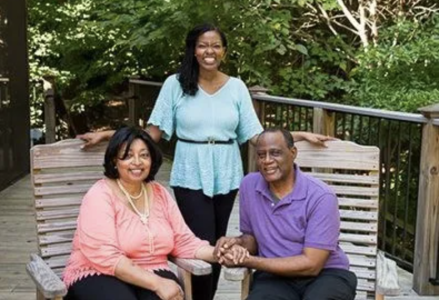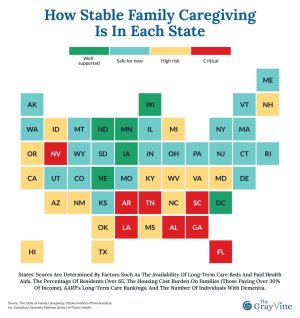A caregiving crisis is growing across the US—here’s what families need to know now
By
Veronica E.
- Replies 3
If you’ve ever helped a loved one get dressed, managed their medications, or simply sat by their side during a tough day, you know that caregiving is both an act of love and a significant sacrifice.
Across the country, millions of Americans are doing this unpaid work every day—often with little help, recognition, or relief.
Now, a new report warns that nearly half of US states are nearing a caregiving emergency, and the pressure on families is becoming impossible to ignore.
As the American population ages and the support system struggles to keep up, many caregivers are being stretched to their limits—emotionally, physically, and financially.
And unless policies shift soon, experts say the crisis could deepen.

A familiar story of sacrifice
Aisha Adkins, 40, knows this reality firsthand.
After spending over a decade caring for her mother through frontotemporal dementia, she barely had time to breathe before her father was diagnosed with vascular dementia in 2023.
What began as gentle reminders and help with laundry soon became daily assistance with bathing, dressing, and feeding.
Aisha gave up more than just her career during those years—she went without a job, without health insurance, and often without time to maintain friendships or relationships.
“I would love to be married someday,” she said.
“I don’t know if that’s something that will happen for me, just because caregiving is a full-time responsibility and not everyone has the capacity to understand what caregiving means... and that they can’t always be your No. 1 priority.”
Even now, as she cares for her father in the early stages of dementia, Aisha is uncertain about what lies ahead.
Her father doesn’t want her to sacrifice her life again, but with short-staffed nursing homes and high turnover, she’s not sure she can entrust his care to anyone else.
“I would worry about his safety,” she admitted.
“I would worry about his ability to be cared for in a way that I would care for him. And so I wrestle, still, with what the future of care looks like.”
Also read: Are you at risk? 5 Medicaid cuts that could change your coverage—and your life
The caregiving scorecard: how states measure up
A new study from Columbia University’s Mailman School of Public Health, sponsored by Otsuka America Pharmaceutical, evaluated each state’s caregiving infrastructure using a detailed scorecard.
The assessment considered factors like:
States were categorized into four groups: well-supported, safe for now, high risk, and critical.
The critical list—indicating urgent need for intervention—included Alabama, Arkansas, Florida, Georgia, Louisiana, Nevada, South Carolina, and Tennessee.
“It’s no surprise to us that every state has work to do to ensure the caregivers living in their states, along with those who need care, have what they need,” said Nicole Jorwic, chief program officer for Caring Across Generations.
“Family caregivers are often on the brink of catastrophe due to lack of support systems.”

Also read: Is Trump's immigration crackdown forcing American elderly into crisis? Find out how
Why so many states are struggling
Several issues are driving this growing crisis:
“We’re just placing more and more pressure on families to take care of their loved ones,” said John McHugh, lead researcher of the Columbia study.
“We’re asking more and more of individuals without providing any sort of support or compensation.”
He added that “A lot of it comes down to a much stronger policy environment around aging.”
Also read: Experts reveal secrets: How to transform the lives of the caregivers you love!
Programs trying to make a difference
Despite limited funding, some states are taking steps to help caregivers:
Still, experts say these programs are not enough to meet growing demand without expanded Medicaid and stronger policy action.
Also read: A major Medicaid shakeup is coming—could your coverage be at risk?
Why Medicaid is a cornerstone of care
Medicaid doesn't just support low-income patients—it funds home- and community-based services, which help seniors remain at home and allow family caregivers to be compensated.
“Medicaid provides crucial home and community-based services that are vital to family caregivers and the people they care for,” said Christina Irving, client services director at the Family Caregiver Alliance.
“It’s an imperfect program, but the only game in town when it comes to funding long-term care,” said Jorwic.
“The choice to not expand has a direct impact on the integrity of our systems and the well-being of caregivers.”
Advocacy groups, including Caring Across Generations, are among the 730 organizations urging Congress to reject proposed Medicaid cuts in the budget.
Though the legislation is still under review, advocates warn it could worsen already fragile caregiving systems.

Also read: Discover how I found a renewed purpose at 60 by becoming a dementia “Hummingbird”—and how you can too!
A community under pressure—and pushing forward
In Georgia, Aisha’s family experienced long delays before finally securing in-home support—first 20 hours a week, later 40.
Her mother had a caseworker, but high turnover in the agency meant years of stalled progress.
Now, Aisha finds connection through other caregivers.
She recently launched the Caregivers of Color Collective on social media, hoping to build community and offer culturally relevant resources.
“In the absence of state support, we rely on each other,” she said.
What can you do if you’re a caregiver?
Read next: Retirees, unlock new opportunities with the top 10 job hunting platforms of 2025!

Are you currently caring for a loved one? What challenges are you facing? Have you found resources that helped—or do you feel left to manage it alone? Share your experience in the comments. You’re not alone—and your voice matters.
Across the country, millions of Americans are doing this unpaid work every day—often with little help, recognition, or relief.
Now, a new report warns that nearly half of US states are nearing a caregiving emergency, and the pressure on families is becoming impossible to ignore.
As the American population ages and the support system struggles to keep up, many caregivers are being stretched to their limits—emotionally, physically, and financially.
And unless policies shift soon, experts say the crisis could deepen.

As America’s population ages, millions of families are stepping into caregiving roles—often with limited support and growing pressure to manage care at home. Image Source: Pexels / Matthias Zomer.
A familiar story of sacrifice
Aisha Adkins, 40, knows this reality firsthand.
After spending over a decade caring for her mother through frontotemporal dementia, she barely had time to breathe before her father was diagnosed with vascular dementia in 2023.
What began as gentle reminders and help with laundry soon became daily assistance with bathing, dressing, and feeding.
Aisha gave up more than just her career during those years—she went without a job, without health insurance, and often without time to maintain friendships or relationships.
“I would love to be married someday,” she said.
“I don’t know if that’s something that will happen for me, just because caregiving is a full-time responsibility and not everyone has the capacity to understand what caregiving means... and that they can’t always be your No. 1 priority.”
Even now, as she cares for her father in the early stages of dementia, Aisha is uncertain about what lies ahead.
Her father doesn’t want her to sacrifice her life again, but with short-staffed nursing homes and high turnover, she’s not sure she can entrust his care to anyone else.
“I would worry about his safety,” she admitted.
“I would worry about his ability to be cared for in a way that I would care for him. And so I wrestle, still, with what the future of care looks like.”
Also read: Are you at risk? 5 Medicaid cuts that could change your coverage—and your life
The caregiving scorecard: how states measure up
A new study from Columbia University’s Mailman School of Public Health, sponsored by Otsuka America Pharmaceutical, evaluated each state’s caregiving infrastructure using a detailed scorecard.
The assessment considered factors like:
- Availability of long-term care beds
- Number of paid health aides per resident
- Percent of residents over 65
- Housing cost burdens
- AARP long-term care rankings
- Dementia prevalence
States were categorized into four groups: well-supported, safe for now, high risk, and critical.
The critical list—indicating urgent need for intervention—included Alabama, Arkansas, Florida, Georgia, Louisiana, Nevada, South Carolina, and Tennessee.
“It’s no surprise to us that every state has work to do to ensure the caregivers living in their states, along with those who need care, have what they need,” said Nicole Jorwic, chief program officer for Caring Across Generations.
“Family caregivers are often on the brink of catastrophe due to lack of support systems.”

Aisha Adkins, pictured with her parents, has spent over a decade caring for her family through multiple dementia diagnoses—one of countless Americans navigating the emotional and financial toll of full-time caregiving. Image Source: USA TODAY / Aisha Adkins.
Also read: Is Trump's immigration crackdown forcing American elderly into crisis? Find out how
Why so many states are struggling
Several issues are driving this growing crisis:
- The population is aging fast. By 2030, all baby boomers will be over 65, and the demand for care will surge.
- There aren’t enough paid caregivers. Many states, especially in the South, have severe shortages of home health aides.
- Medicaid access is limited. Ten states have not expanded Medicaid, which funds critical services that help families care for loved ones at home.
- Families are financially strained. Unpaid caregivers often reduce work hours or leave the workforce entirely—losing income, health insurance, and retirement savings in the process.
“We’re just placing more and more pressure on families to take care of their loved ones,” said John McHugh, lead researcher of the Columbia study.
“We’re asking more and more of individuals without providing any sort of support or compensation.”
He added that “A lot of it comes down to a much stronger policy environment around aging.”
Also read: Experts reveal secrets: How to transform the lives of the caregivers you love!
Programs trying to make a difference
Despite limited funding, some states are taking steps to help caregivers:
- Nevada provides $2.5 million annually to community organizations for respite care and is working on two federal grants to expand awareness and access.
- South Carolina created a Dementia Care Specialist program, a Caregiver and Alzheimer’s Resource Division, and has long operated a Family Caregiver Support Program focused on respite services.
- Georgia has deployed community-based dementia care specialists, added caregiver stress assessments, and launched the Georgia Respite Care Study in partnership with the University of North Georgia.
- Alabama continues to support caregivers through the Alabama CARES program, as well as specialized programs for caregivers impacted by dementia, the opioid epidemic, and multigenerational responsibilities.
Still, experts say these programs are not enough to meet growing demand without expanded Medicaid and stronger policy action.
Also read: A major Medicaid shakeup is coming—could your coverage be at risk?
Why Medicaid is a cornerstone of care
Medicaid doesn't just support low-income patients—it funds home- and community-based services, which help seniors remain at home and allow family caregivers to be compensated.
“Medicaid provides crucial home and community-based services that are vital to family caregivers and the people they care for,” said Christina Irving, client services director at the Family Caregiver Alliance.
“It’s an imperfect program, but the only game in town when it comes to funding long-term care,” said Jorwic.
“The choice to not expand has a direct impact on the integrity of our systems and the well-being of caregivers.”
Advocacy groups, including Caring Across Generations, are among the 730 organizations urging Congress to reject proposed Medicaid cuts in the budget.
Though the legislation is still under review, advocates warn it could worsen already fragile caregiving systems.

A new national caregiving scorecard ranks states by how well they support family caregiver. Image Source: The State of Family Caregiving: Otsuka America Pharmaceutical Inc, Columbia University Mailman School of Public Health.
Also read: Discover how I found a renewed purpose at 60 by becoming a dementia “Hummingbird”—and how you can too!
A community under pressure—and pushing forward
In Georgia, Aisha’s family experienced long delays before finally securing in-home support—first 20 hours a week, later 40.
Her mother had a caseworker, but high turnover in the agency meant years of stalled progress.
Now, Aisha finds connection through other caregivers.
She recently launched the Caregivers of Color Collective on social media, hoping to build community and offer culturally relevant resources.
“In the absence of state support, we rely on each other,” she said.
What can you do if you’re a caregiver?
- Find local resources: Start with your area's support services and respite care options.
- Advocate for policy change: Urge your state representatives to expand Medicaid and increase caregiver support funding.
- Protect your health: Take breaks when possible, seek emotional support, and remember that your well-being matters too.
- Share your voice: Stories like Aisha’s are powerful. The more people speak up, the more attention this issue gets.
Read next: Retirees, unlock new opportunities with the top 10 job hunting platforms of 2025!
Key Takeaways
- Nearly half of US states are nearing a caregiving emergency, with eight—including Georgia, Florida, and South Carolina—ranked in critical need.
- Family caregivers often work without pay, health benefits, or support systems, leading to burnout, strained finances, and social isolation.
- Medicaid is key to funding home-based care and supporting caregivers, but many states have not expanded access, limiting services and compensation.
- Some states offer programs like respite care and caregiver support, but experts say more robust investment and national policy reform are urgently needed.
Are you currently caring for a loved one? What challenges are you facing? Have you found resources that helped—or do you feel left to manage it alone? Share your experience in the comments. You’re not alone—and your voice matters.






